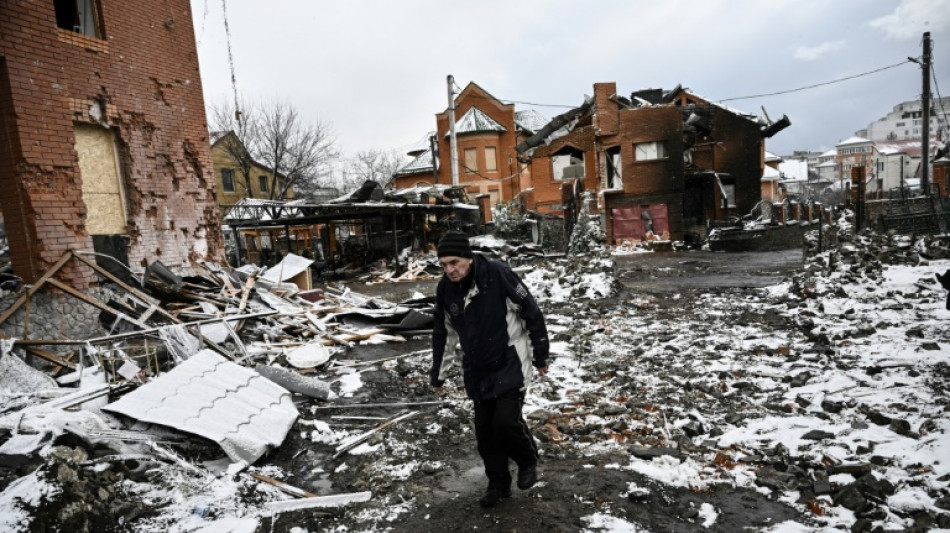
On edge of war: Russian missiles chink away at Kyiv's southern flank

The tinny Ukrainian voice in the supermarket's loudspeaker urged exiting shoppers to rush home and switch off the gas.
"This is a warning: turn off your electricity and gas, get your first aid kit, documents, supply of food and water, and go to your nearest bomb shelter," the voice intoned over the wail of air raid sirens.
It was the second alarm to sound in under an hour over the snow-covered central Ukrainian city of Bila Tserkva.
And it only added to the dour mood of mother-of-two Yulia Ivashchyuk as she walked empty-handed out of the city's main shopping centre.
"The shelves are empty, they are bombing, rockets are falling from the sky," the 45-year-old complained.
"There is no lactose-free milk that my little one needs. What else can go wrong? I am not sure I want to know."
Bila Tserkva's location 75 kilometres (45 miles) southwest of Kyiv once made it a perfect commuter spot for people working in the Ukrainian capital.
But the city of 200,000 now has the unfortunate distinction of being on the direct path of cruise missiles that Russia is launching at Kyiv from the Black Sea.
A few of them smashed into Bila Tserkva's strategic airfield and some factories when Russia launched its assault on Ukraine on February 24.
A cluster of fancy new homes being built near the city's Ros River were torn apart over the weekend by either a stray missile or Russian bombs.
No one here understands why it happened -- or why Russia is invading Ukraine.
"Putin has gone crazy and is doing mad things," said fellow shopper Serghiy Zabozhniy.
"His behaviour is unbalanced and people are afraid that he might press the nuclear button," the 63-year-old entrepreneur said.
- Escape route -
Russia's attempts to besiege Kyiv have seen the city of three million cut off from the rest of the country on three sides.
Battles are raging on Kyiv's northern and western outskirts.
The roads running east are cut off by Russian tanks and minefields after an hour's drive.
The south represents Kyiv's main escape route as well as the only way it can be supplied with food and fuel.
The worry in Bila Tserkva is that Russian tanks now on the western edge of Kyiv may soon swoop down and head their way.
"Everyone is worried. They hear the air raid sirens several times a day," said carpenter Andriy Zaleznyak.
"They've already hit us nearly a dozen times. It's hard to count all the explosions. All the days are blurring into one."
The 39-year-old was helping clear the rubble from one of the three houses destroyed by the mysterious weekend attack.
Officials are still not clear what levelled the buildings.
Russian warplanes routinely buzz overhead.
People on the streets share images on their phones of cruise missiles they have filmed flying toward Kyiv a few hundred metres above ground.
Zaleznyak said a family of six that lived in one of the destroyed houses was fortunate to be out of town on the night of the air strike.
"They could have all been killed," fellow handyman Bogdan Remmenniy said next to the charred remains of the family's garden shed.
- Edge of war -
Bila Tserkva has the air of a city finely balanced on the edge of war.
Its relatively well-stocked main supermarket has an empty dairy section and shuttered alcohol isles.
Alcohol sales were banned across Ukraine when the government decided to give everyone access to firearms in order to build a new volunteer army in the first days of war.
Queues snake down the street outside drug stores and bank outlets.
Bila Tserkva still lacks Kyiv's myriad of sandbagged checkpoints or men with assault rifles policing traffic at intersections.
But a contingent of tanks rolled down the highway leading from the city toward the capital.
This slightly surreal state of neither peace nor all-out war lends the city some of the optimism and bravado Kyiv enjoyed before the Russians seized its western outskirts.
"If the Russians ever come here, they will never get past us," college student Bogdan Martynenko said while smoking in a parking lot with his friends.
"We have territorial defence units, our police, our guys. We all know each other -- they wouldn't dare," he said with a grin.
S.Mitchell--TNT